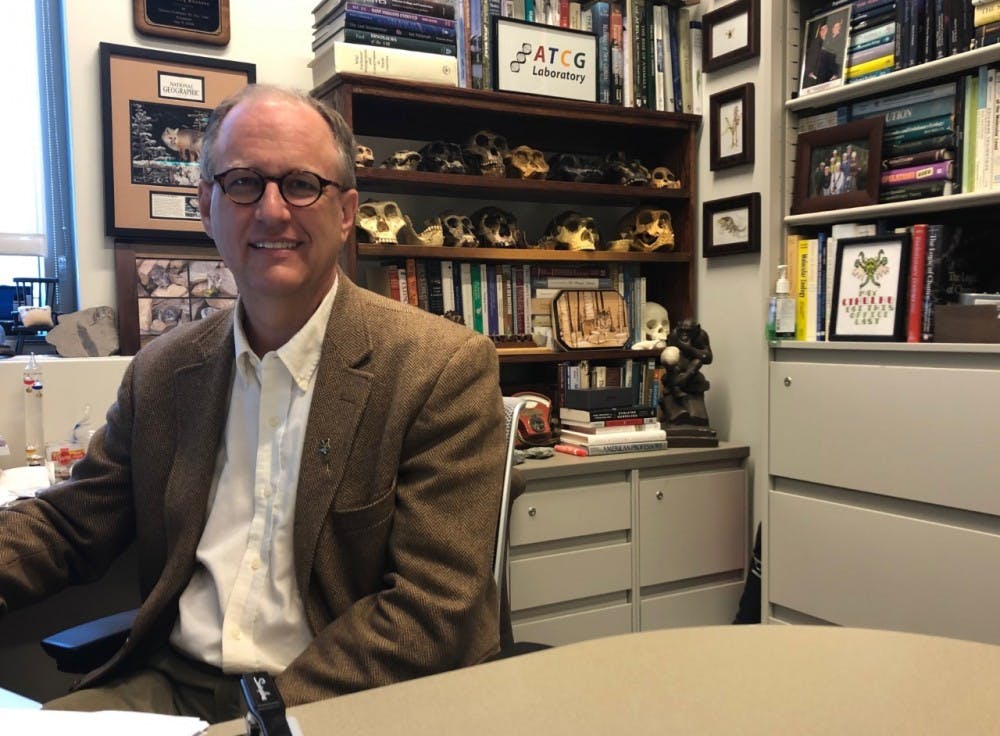Brad Swanson discusses his involvement at CMU, in A-Senate

Biology professor and Academic Senate Chair Bradley Swanson poses in his office surrounded by animal specimens Sept. 20 in the Biosciences building.
In his small office in the Biosciences building, Bradley Swanson has built himself an ecosystem. He surrounds himself with literature, plants and animal skulls. The clock on his wall echoes with chirping birds on the hour. His schedule is always tightly packed with meetings, but he finds a way to squeeze in every student that needs his help.
Swanson holds multiple titles at Central Michigan University. He is a biology faculty member who specializes in evolution, conservation biology and genetics and is the director of the Applied Technology in Conservation Genetics Lab, a wildlife forensics laboratory. He has also served as chairperson of CMU’s Academic Senate for the last three years.
Swanson’s love of biology stems back to his early childhood. He grew up in Hamburg Township, which borders Brighton State Recreation Area.
“We had a giant forest as our backyard and my nearest neighbor was a mile away,” Swanson said. “A lot of my time was spent running around in the woods with our dogs, that’s what started it all.”
Swanson attended University of Michigan for an undergraduate degree in biology and graduated in 1990. His passion for research was awakened when he was hired to run a research project in New Mexico the following year. With a passion for population research ignited, Swanson obtained a master’s degree from the University of Idaho and a Ph.D. from Purdue University.
After pinballing from one university to the next, Swanson found an advertisement for a tenure-track position at CMU.
“Coming back to your home state doesn’t happen a lot for faculty,” Swanson said. “I was able to be closer to my family, my friends and my wife’s family. It was just a perfect situation.”
Swanson began teaching at CMU in 2001, making his term as a faculty member as old as a current standing freshman.
Brad Swanson has been serving in various positions of the academic senate since 2012. After he served a term as a senator he quickly gravitated towards the executive board.
Academic senate's executive board consists of the chair, a student senator, faculty senators and the university president and provost. The executive board sets an agenda and plans discussion topics for each meeting. The senate body comprises faculty members from each department, deans of each college and student senators.
Swanson was the only candidate who was nominated for senate chairperson in the 2016-17 academic year. Usually, chairpersons stay for two years, but Swanson ran for a third year to provide “institutional memory” for the new president, provost and other executive board members.
“The hardest part of the job... is getting lots of questions, lots of emails, lots of calls," he said. “(Academic) senate really deals with curriculum and learning processes at the university, so any time there’s an issue people always turn to the chair of the senate to ask, ‘what’s going on?’”
Swanson said students can shape their curriculum and their programs by paying attention to the academic senate.
“Every student senator’s vote counts as much as anyone else’s. If there are things they want to be brought to the university’s attention, it’s a way to bring it forward,” Swanson said. “Since we are an academic senate, not a faculty senate, everyone has a voice.”





